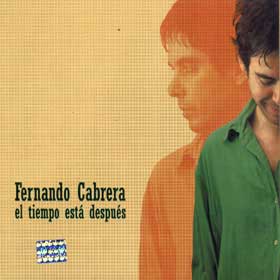
"El Tiempo Está Después" Was Issued In 2004. It Covers Fernando Cabrera's Very First Years As A Solo Artist.
The first Uruguayan album I purchased was this compilation by Fernando Cabrera, and it only makes sense he is the one artist I have chosen to inaugurate this section of MusicKO with.
Born in 1956 in Montevideo, he is one of the most respected composers in the whole country. He performs what we call “Música popular”, a category that is comparable with folk music in English-speaking countries to a considerable extent. His primary instrument is the guitar, and his MO on the whole is not that removed from artists I adore like Elvis Costello, XTC and Richard Thompson in the sense that he is a very distinguished lyricist whose vocal delivery is anything but mainstream, and while that costs him some wider appeal it gives him a certain exclusiveness that make him all the more beloved by his followers.
This compilation was first issued in the year 2004, and it gathers together the best cuts from his first three solo recordings (he had been part of the groups “MonTRESvideo” and “Baldío” during the late 70s and early 80s). These albums are “Autoblues” (1985), “Buzos Azules” (1986) and “El Tiempo Está Después” (1989).
Fourteen tracks are featured. Some are very short, like the opening “Iluminada” [Illuminated] and the set closer “No Te Olvidés” [Don’t You Forget], some rock quite energetically like “Tangente” [Tangent] and “Agua” [Water], and some have a lovely River Plate sensibility such as “La Garra Del Corazón” [The Drive Of The Heart] and “Los Viajantes” [The Travelers], with “La Garra Del Corazón” being actually a tango. But every single composition could be described as (to quote Bobby Darin) true poetry in motion. That is particularly true when it comes to the track that lends its title to the album, which in English is rendered as “Time Comes Afterwards” and the phenomenal “Imposibles” [Impossible Things] and “Pandemonios” [Pandemoniums]. Continue reading
